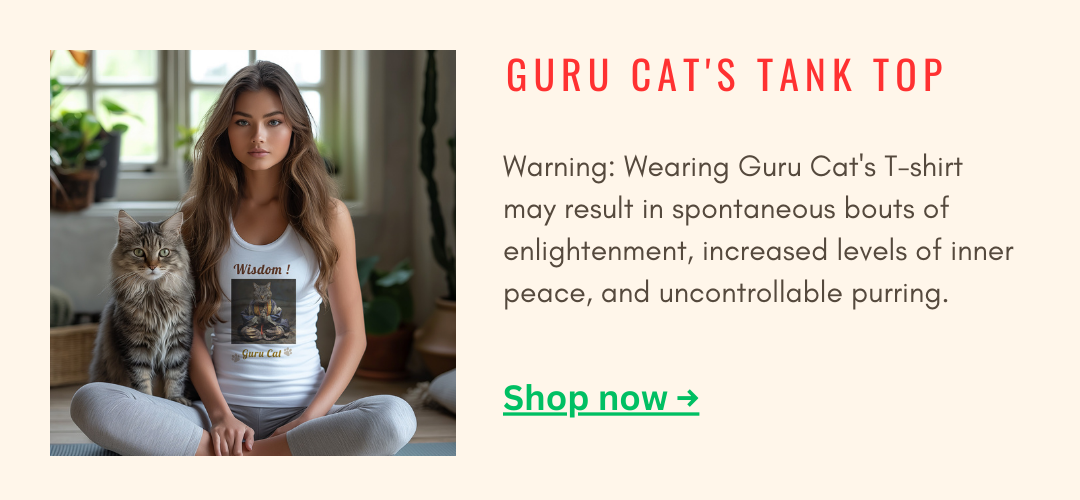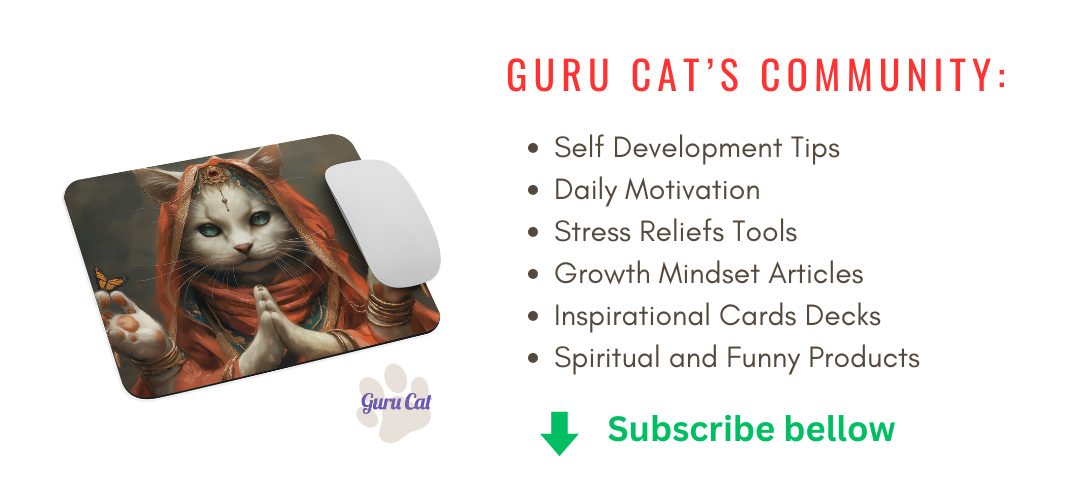How To Cope With Anxiety: Insights from Guru Cat
Introduction
Anxiety – that pesky little monster that sneaks into our minds and wreaks havoc on our well-being. It’s like having an uninvited guest who insists on staying, making you feel jittery, overwhelmed, and out of control. Whether it’s a constant hum of worry about the future, an irrational fear of social situations, or a full-blown panic attack that feels like a heart attack, anxiety affects millions of adults every day. It can be triggered by anything from work stress and family responsibilities to personal health concerns and even global events.
But fear not, for I, Guru Cat, am here to guide you through the maze of anxiety management with wisdom, wit, and a touch of feline humor. Imagine me as your furry companion, sitting serenely on a cozy cushion, purring wise advice into your ear. Together, we’ll explore practical tips, scientific insights, and real-life examples to help you conquer your anxiety and reclaim your peace of mind.
Why should you trust a cat, you ask? Well, we cats are experts in relaxation and mindfulness. Have you ever seen a cat having a panic attack? Exactly. We know the secrets of living in the moment, stretching out the stress, and finding joy in the simple pleasures of life – like a sunny spot on the floor or a good scratch behind the ears. So, let’s embark on this journey together, embracing a holistic approach to managing anxiety, where science meets the serenity of a cat’s purr.
Anxiety doesn’t have to rule your life. With the right knowledge and tools, you can learn to manage it effectively and even turn it into a strength. As we delve into the causes, symptoms, and coping strategies, you’ll discover that anxiety, while challenging, can also be an opportunity for growth and self-discovery. So, sit back, relax (preferably with a warm cup of tea and maybe a cat on your lap), and let’s dive into the world of anxiety management, where a calmer, more centered you awaits.
Understanding Anxiety
Scientific Studies on Anxiety
Understanding anxiety from a scientific perspective provides valuable insights into its management and treatment. Here, we delve into three pivotal studies that highlight effective methods for reducing anxiety symptoms, each offering evidence-based approaches that can be integrated into daily life.
#Study 1: Effects of Cognitive Behavioral Therapy (CBT) on Anxiety
Cognitive Behavioral Therapy (CBT) is a cornerstone in the treatment of anxiety disorders. This study, published by the American Psychological Association, explored the efficacy of CBT in treating Generalized Anxiety Disorder (GAD).
– Methodology: The study involved 150 participants diagnosed with GAD, randomly assigned to receive either CBT or a placebo treatment over a 12-week period. Participants attended weekly sessions with trained therapists and engaged in homework assignments designed to challenge and modify negative thought patterns.
– Findings: Results showed that 60% of participants undergoing CBT experienced significant reductions in anxiety symptoms compared to only 20% in the placebo group. CBT was particularly effective in reducing worry, improving coping strategies, and increasing overall quality of life.
– Implications: This study underscores the importance of CBT as a structured, short-term, and effective approach to managing anxiety. It highlights how altering thought patterns can lead to meaningful changes in emotional and behavioral responses.
#Study 2: The Role of Exercise in Reducing Anxiety Symptoms
Physical activity is often recommended as a natural remedy for anxiety, and this study by the National Institute of Mental Health (NIMH) provides robust evidence supporting its benefits.
– Methodology: This study tracked 200 adults with varying levels of anxiety over six months. Participants were divided into two groups: one engaged in regular aerobic exercise (such as jogging or cycling) for 30 minutes, five times a week, while the control group maintained their usual routines without added physical activity.
– Findings: The exercise group exhibited a 40% reduction in anxiety symptoms, including improved mood, decreased tension, and better sleep quality. Notably, the study found that even moderate exercise was beneficial, with more intense workouts yielding greater reductions in anxiety.
– Implications: Exercise enhances brain function, releases endorphins, and reduces muscle tension, all of which contribute to lower anxiety levels. This study encourages incorporating regular physical activity into daily routines as a practical and accessible way to manage anxiety.
#Study 3: Impact of Mindfulness Meditation on Anxiety Reduction
Mindfulness meditation has gained popularity as a technique to alleviate anxiety, and this study published in the Journal of Clinical Psychology examines its effectiveness.
– Methodology: The study involved 100 adults with clinically diagnosed anxiety disorders who participated in an 8-week Mindfulness-Based Stress Reduction (MBSR) program. Participants attended weekly group sessions, engaged in daily meditation practices at home, and kept journals of their experiences.
– Findings: Participants reported a 35% reduction in anxiety symptoms, including decreased rumination, greater emotional regulation, and enhanced self-awareness. Follow-up assessments indicated that these benefits were sustained six months after the program ended.
– Implications: Mindfulness meditation helps individuals become more aware of their thoughts and feelings in a non-judgmental way, reducing the impact of stressors. This study supports mindfulness as a valuable tool for long-term anxiety management.
These studies collectively emphasize the importance of a multifaceted approach to anxiety treatment. Cognitive Behavioral Therapy, physical exercise, and mindfulness meditation each offer unique benefits, providing a comprehensive toolkit for those seeking to manage their anxiety effectively. Integrating these scientifically validated strategies into daily life can lead to significant improvements in mental health and overall well-being.
Key Facts About Anxiety
Understanding the multifaceted nature of anxiety can empower individuals to recognize, address, and manage their symptoms more effectively. Here are ten key facts about anxiety that illuminate its prevalence, impact, and potential for treatment:
- Anxiety Disorders are Prevalent: Anxiety disorders are the most common mental illness in the U.S., affecting 40 million adults aged 18 and older every year, which is about 18.1% of the population. Despite their high prevalence, many people remain undiagnosed and untreated.
- Gender Differences: Women are twice as likely to be affected by anxiety disorders as men. Hormonal fluctuations, societal expectations, and biological differences are thought to contribute to this disparity.
- Early Onset: Anxiety disorders often begin in childhood, adolescence, or early adulthood. Early intervention and treatment are crucial to prevent the condition from worsening and to improve long-term outcomes.
- Comorbidity with Other Disorders: Anxiety disorders frequently co-occur with other mental health conditions, such as depression, substance abuse, and eating disorders. This comorbidity can complicate diagnosis and treatment, requiring a comprehensive approach.
- Impact on Daily Life: Chronic anxiety can significantly impair daily functioning, affecting work performance, social relationships, and overall quality of life. Physical symptoms such as headaches, gastrointestinal issues, and chronic pain are also common.
- Role of Genetics: Research indicates a strong genetic component to anxiety disorders. Individuals with a family history of anxiety or other mental health conditions are at a higher risk of developing anxiety disorders themselves.
- Effectiveness of Treatment: Anxiety disorders are highly treatable, yet only 36.9% of those suffering receive treatment. Effective treatments include therapy (such as Cognitive Behavioral Therapy), medication, lifestyle changes, and self-help strategies.
- Exercise and Anxiety: Regular physical activity can reduce anxiety symptoms by up to 20-30%. Exercise promotes the release of endorphins, improves sleep, and reduces muscle tension, all contributing to lower anxiety levels.
- Mindfulness and Meditation: Mindfulness-based practices, such as meditation and yoga, have been shown to reduce anxiety symptoms by fostering greater awareness and acceptance of the present moment. These practices can decrease stress and improve emotional regulation.
- Impact of Nutrition: Diet plays a crucial role in managing anxiety. Consuming a balanced diet rich in whole foods, including fruits, vegetables, lean proteins, and healthy fats, supports brain health. Conversely, high intake of sugar, caffeine, and processed foods can exacerbate anxiety symptoms.
These key facts not only demystifies the condition but also highlights the importance of early intervention, holistic treatment approaches, and the potential for recovery. By being informed, individuals can take proactive steps towards managing their anxiety and improving their overall well-being.
Tips for Dealing with Anxiety
Managing anxiety requires a multifaceted approach that includes both immediate coping strategies and long-term lifestyle changes. Here are ten enriched tips to help you navigate and reduce anxiety effectively:
- Practice Deep Breathing Exercises
– Technique: Engage in diaphragmatic breathing, also known as deep belly breathing. Place one hand on your chest and the other on your abdomen. Inhale deeply through your nose for a count of four, allowing your abdomen to rise, hold for a count of four, then exhale slowly through your mouth for a count of six. Repeat this process for several minutes.
– Benefits: Deep breathing can activate the parasympathetic nervous system, reducing the body’s stress response and promoting relaxation.
- Engage in Regular Physical Activity
– Suggested Activities: Include a mix of aerobic exercises (like running, cycling, or swimming) and strength training. Yoga and tai chi are also excellent for combining physical activity with mindfulness.
– Benefits: Physical activity boosts the production of endorphins, natural mood lifters, and can reduce muscle tension, improve sleep, and enhance overall mental health.
- Maintain a Balanced Diet
– Foods to Include: Opt for nutrient-rich foods such as leafy greens, fatty fish rich in omega-3 fatty acids, nuts, seeds, whole grains, and lean proteins. Incorporate antioxidant-rich foods like berries and dark chocolate.
– Foods to Avoid: Limit intake of processed foods, high-sugar snacks, and excessive caffeine and alcohol, as they can exacerbate anxiety symptoms.
- Prioritize Sleep
– Tips for Better Sleep: Establish a regular sleep schedule by going to bed and waking up at the same time every day. Create a calming bedtime routine, such as reading or taking a warm bath. Ensure your sleeping environment is comfortable, cool, and free of distractions.
– Benefits: Quality sleep is essential for cognitive function and emotional regulation. Poor sleep can increase stress and anxiety levels.
- Try Mindfulness and Meditation
– Simple Mindfulness Exercises: Begin with short sessions of mindfulness meditation, focusing on your breath or using guided meditations available through various apps. Practice grounding techniques, such as the “5-4-3-2-1” method, to bring your attention to the present moment by naming five things you see, four things you feel, three things you hear, two things you smell, and one thing you taste.
– Benefits: Mindfulness helps reduce the mind’s tendency to dwell on negative thoughts, fostering a sense of calm and clarity.
- Limit Caffeine and Alcohol
– Impact: Caffeine is a stimulant that can increase heart rate and anxiety levels. Alcohol, while initially calming, can disrupt sleep and increase anxiety over time.
– Advice: Reduce your intake of caffeinated beverages, such as coffee and energy drinks, and avoid alcohol, particularly close to bedtime.
- Stay Connected
– Building a Support Network: Reach out to friends, family, or support groups. Share your feelings and experiences with trusted individuals who can offer support and understanding. Consider joining online forums or local groups where you can connect with others facing similar challenges.
– Benefits: Social connections provide emotional support, reduce feelings of isolation, and offer opportunities for practical advice and encouragement.
- Learn to Say No
– Setting Boundaries: Identify your limits and prioritize your tasks. Politely decline additional responsibilities or social engagements that cause unnecessary stress. Practice assertive communication to express your needs and boundaries clearly.
– Benefits: Setting boundaries helps manage workload and prevents burnout, allowing you to focus on activities that align with your well-being.
- Seek Professional Help
– When to Seek Help: If anxiety is significantly impacting your daily life, consider seeking help from a mental health professional. Therapists can provide various forms of therapy, such as Cognitive Behavioral Therapy (CBT), which is highly effective for treating anxiety.
– Medication Options: In some cases, medication may be necessary. A healthcare provider can prescribe anxiolytics or antidepressants to help manage symptoms.
- Practice Self-Compassion
– Techniques: Treat yourself with kindness and understanding during difficult times. Challenge self-critical thoughts by asking yourself what you would say to a friend in a similar situation. Engage in self-care activities that you enjoy and that nurture your well-being.
– Benefits: Self-compassion can reduce feelings of guilt and shame associated with anxiety, fostering a more supportive and nurturing internal dialogue.
By incorporating these tips into your daily routine, you can build resilience against anxiety and improve your overall mental health. Remember, managing anxiety is a journey, and it’s important to be patient and compassionate with yourself as you explore different strategies to find what works best for you.
Conclusion
Anxiety may be a formidable foe, but with the right strategies and support, it is entirely manageable. By understanding the nature of anxiety, implementing practical coping techniques, and seeking professional help when necessary, you can significantly improve your well-being. Remember, anxiety is not a sign of weakness but a common human experience that many people successfully navigate every day.
The journey to managing anxiety is akin to a cat’s graceful leap onto a high shelf – it requires balance, persistence, and a bit of finesse. Embrace the techniques we’ve discussed: practice deep breathing to center yourself, engage in regular physical activity to boost your mood, and maintain a balanced diet to nourish your body and mind. Prioritize sleep to rejuvenate your spirit, and delve into mindfulness and meditation to cultivate inner peace.
Limiting caffeine and alcohol can reduce anxiety’s edge, while staying connected with supportive friends and family reminds you that you are not alone. Learn to set boundaries to protect your time and energy, and never hesitate to seek professional help when needed. Above all, practice self-compassion, treating yourself with the same kindness and understanding you would offer a beloved pet.
By integrating these strategies into your life, you can transform anxiety from a relentless adversary into a manageable aspect of your existence. Picture yourself as a serene cat, basking in the sunlight, unbothered by the world’s worries. With patience and practice, you can achieve this state of calm and confidence.
As we part ways, remember that even in the darkest moments, a touch of humor and a generous dose of self-compassion can go a long way. So, take a deep breath, give yourself a break, and trust that you have the power to navigate through anxiety with grace and resilience. As always, your trusty Guru Cat is here to remind you that you’re not alone in this journey – together, we can make every day a little brighter and a lot more manageable. Meow-nage your anxiety with the wisdom of a cat, and you’ll find peace in the most unexpected places.





